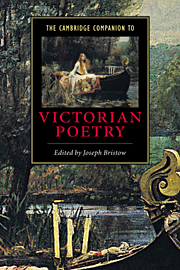Book contents
- Frontmatter
- 1 Reforming Victorian poetry: poetics after 1832
- 2 “The Lady of Shalott” and the critical fortunes of Victorian Poetry
- 3 Experimental form in Victorian poetry
- 4 The dramatic monologue
- 5 Victorian meters
- 6 Victorian poetry and historicism
- 7 Victorian poetry and science
- 8 Victorian poetry and religious diversity
- 9 The Victorian poetess
- 10 The poetry of Victorian masculinities
- 11 Aesthetic and Decadent poetry
- 12 Victorian poetry and patriotism
- 13 Voices of authority, voices of subversion: poetry in the late nineteenth century
- Glossary
- Guide to Further Reading
- Index
3 - Experimental form in Victorian poetry
Published online by Cambridge University Press: 28 May 2006
- Frontmatter
- 1 Reforming Victorian poetry: poetics after 1832
- 2 “The Lady of Shalott” and the critical fortunes of Victorian Poetry
- 3 Experimental form in Victorian poetry
- 4 The dramatic monologue
- 5 Victorian meters
- 6 Victorian poetry and historicism
- 7 Victorian poetry and science
- 8 Victorian poetry and religious diversity
- 9 The Victorian poetess
- 10 The poetry of Victorian masculinities
- 11 Aesthetic and Decadent poetry
- 12 Victorian poetry and patriotism
- 13 Voices of authority, voices of subversion: poetry in the late nineteenth century
- Glossary
- Guide to Further Reading
- Index
Summary
In 1844, Elizabeth Barrett Browning wanted to write “a poem of a new class,” one that included “[c]onversations & events” and “philosophical dreaming & digression.” She also wanted to purify George Gordon Byron's sexually contentious poetry, to write “a Don Juan, without the mockery & impurity.” But this moral aim, while acknowledging her wish to elude the precedents created by Byron, was less important than her larger formal purpose. This desire to compose a new poetic form, one that would adapt established styles to contemporary needs, and particularly one that would combine narrative and speculative commentary with the requirements of aesthetic unity, typifies many Victorian poets. It led to widespread poetic play that transgressed boundaries between the three classical genres identified by the Greeks - epic (or narrative), drama, and lyric. And in the twentieth century it led in turn to standard critical discussions of Victorian experiments with form.
Established accounts of experimentation tend to work within a critical legacy that associates experimental writing with internal features of structure and style. More recent critical practice, however, directs our attention to broader cultural contexts and particularly to the potential for cultural critique. Robert Con Davis and Ronald Schleifer, for instance, distinguish two types of critique: institutional critique, which aims to expose the conditions and principles which govern existing institutions and cultural practices, and transformative critique, which aims not only to question the conditions which sustain existing institutions but to change cultural practice.
- Type
- Chapter
- Information
- The Cambridge Companion to Victorian Poetry , pp. 46 - 66Publisher: Cambridge University PressPrint publication year: 2000
- 1
- Cited by



